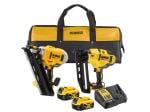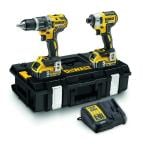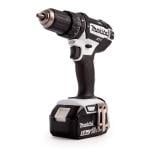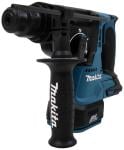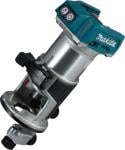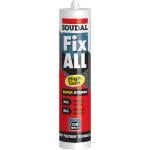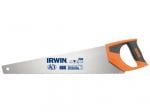Batteries for Cordless Drills & Power Tools: NiCD Vs NiMH Vs Li-Ion
When it comes to selecting a cordless drill, you need to ensure that you find the perfect fit for you. And one of the most important features and specs to consider is the battery that you will be using.
There are three main battery types with cordless drills, these are Nickel-Cadium (NiCD), Nickel-Metal Hydride (NiMH), and Lithium-ion (Li-ion).
In this article, we’re going to take a look at each of them and layout the various pros and cons, so that you can decide which is best for you.
Nick-Cadmium Batteries for Cordless Drills
The NiCD battery is the oldest of the three types. That said, despite its age, it is still widely used since it is unparalleled when it comes to performing under rigorous conditions. Additionally, these batteries are relatively inexpensive with a quality life cycle. Overall, you will find that the Li-Ion and NiMH batteries are better, but that’s not to say that you should dismiss a Nick-Cadium battery altogether.
One of the key reasons why you still see NiCD batteries on the shelves in your local hardware stores is their toughness and resistance to impact, including resistance to both high and low temperatures. This makes it a formidable battery onsite, where toughness and resistance are incredibly handy. But aside from that, NiCD batteries deliver a good flow of electric current.
Whilst keeping the battery in a state of deep discharge is not recommended, if you do so, they aren’t going to suffer as much as the other two batter options. If you look at it from an economic standpoint, the NiCD battery is significantly less expensive than Li-Ion and NiMH batteries. And of course, given the fact that NiCD batteries are the oldest, you may find that some of their characteristics are somewhat dated.
As an example: they weigh more than the other options and have a lower capacity. When using a NiCD battery, you will need to make sure that their charge doesn’t drop below 70% between charging. If you do so, you will be diminishing their lifespan. That being said, performing a deep discharge once a month can be beneficial.
Another thing to know about NiCD batteries is that they need to be given time to cool down before being put back on charge, which can be a ball ache. Here’s everything you need to know about NiCD batteries:
- They have around 1,000 charge cycles
- Works with 15-20% discharge
- A lower capacity of 1.2Ah – 2.2Ah
- Fast charge time
- Proper maintenance with monthly deep discharge is required
- High memory effect impact if you do not regularly maintain
- Extremely tough and durable
Nickel-Metal Hybride Batteries for Cordless Drills
Next up, we have the NiMH battery, which is more expensive than NiCD. However, they do have many great improvements which makes it all worth it.
One of the most noticeable improvements is that the NiMH is far better for the environment. The biggest advantage of all, however, is that their capacity is often 2 or 3 times better than a regular NiCD battery, due to their superior energy density. Similar to the NiCD battery, NiMH batteries need to be stored and charged in the proper conditions.
They weigh less than the NiCD and are less expensive than their Li-Ion counterpart.
NiMH batteries are more sensitive to high and low temperatures. As a general rule of thumb, you should keep them between 33°F and 103°F. When they have been unused or left in a state of discharge, a NiMH battery will experience a significant amount more damage than a NiCD battery.
This means that their lifespan and overall storage capacity will shorten significantly, so you must be mindful of that. And similarly to the NiCD batteries, they must be kept at over 70% capacity, with one deep discharge being required once every three months to prevent the dreaded memory effect.
Here’s Everything You Need to Know About NiMH Batteries:
- Strong cycle life depending on storage and maintenance
- Rapid self-discharge (20-30%
- An impressive 2.2Ah to 3.0Ah capacity
- A fast charge time
- Semi-regular maintenance with 3-monthly deep discharge
- When properly maintained, they have less memory effect than a NiCD battery
- They are sensitive to heat
Lithium-Ion Batteries
Finally, we have the Li-Ion batteries. These are the newest of the three batteries and arguably the best option of the three when taking everything into account.
Whilst they are not without drawbacks, a Li-Ion battery is far superior. Yes, they are more expensive than the other two options, but that is justified.
The biggest problem with the Li-Ion battery is its sensitivity to heat. Too much heat will deteriorate their inner components and changes the electrochemical processes which take place inside.
Additionally, age and excessive use will significantly shorten their lifespan. Whilst the shorter lifespan might seem like a drawback, they do have a much higher capacity with a fast recharge rate.
These batteries are still being improved, so they will surely be far more impressive in the future. However, one thing that is more or less perfect, is their weight, given the fact that they are the lightest of the three battery types. Li-Ion batteries have a high energy density, but they are also less sensitive to changes in temperature as well.
Another huge benefit is the fact that Li-Ion batteries do not suffer from any memory effects, which means that they don’t need such regular maintenance. Further to that, the Li-Ion battery has a responsive shape that allows them to take on any form and be physically designed to provide any tool with better balance and performance.
They also have a superior charge and recharge cycle and do not cause any damage to the environment.
Here’s Everything You Need to Know About The Li-Ion Battery:
- 300-500 charges (2-3-year life cycle)
- The most expensive battery of the 3
- Practically no self-discharge
- The superior capacity of 3.0Ah and upwards
- Little to no maintenance required
- No memory ailment effects
Conclusion
Ultimately, the Li-Ion is difficult to ignore given its superior advantages. That said, if the price is an issue for you, then the NiCD and NiMH batteries can certainly provide you with some quality usage. Just weigh it up and make your decision based on the type of work that you do, and the way you like to perform.
Listed here are links to our Batteries & Chargers products:


